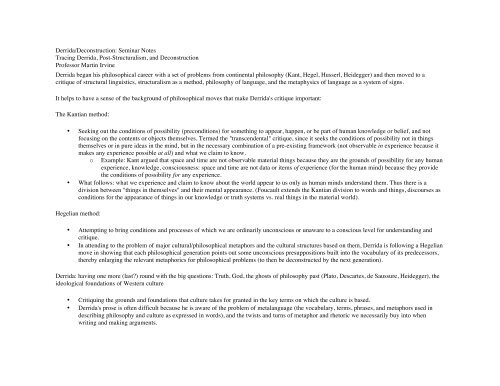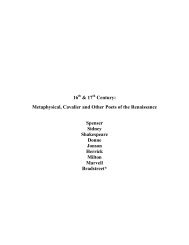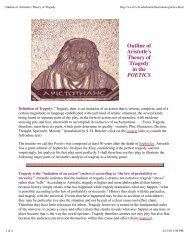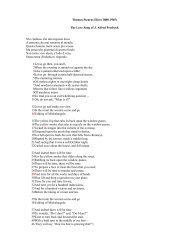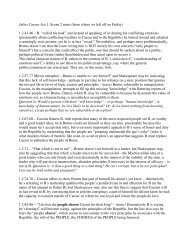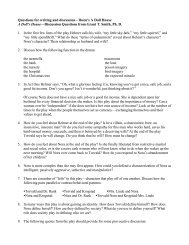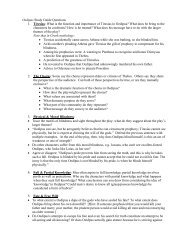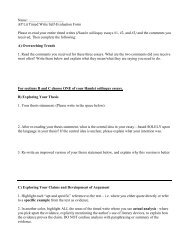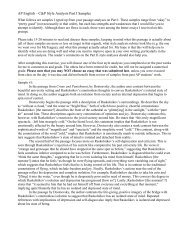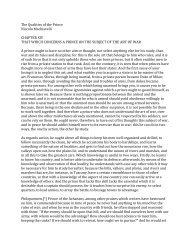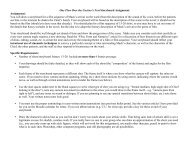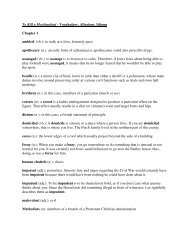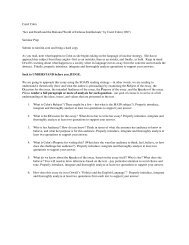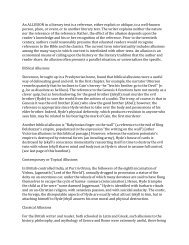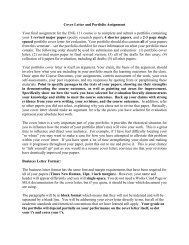Derrida/Deconstruction: Seminar Notes Tracing ... - Whs.babienko.net
Derrida/Deconstruction: Seminar Notes Tracing ... - Whs.babienko.net
Derrida/Deconstruction: Seminar Notes Tracing ... - Whs.babienko.net
Create successful ePaper yourself
Turn your PDF publications into a flip-book with our unique Google optimized e-Paper software.
<strong>Derrida</strong>/<strong>Deconstruction</strong>: <strong>Seminar</strong> <strong>Notes</strong><br />
<strong>Tracing</strong> <strong>Derrida</strong>, Post-Structuralism, and <strong>Deconstruction</strong><br />
Professor Martin Irvine<br />
<strong>Derrida</strong> began his philosophical career with a set of problems from continental philosophy (Kant, Hegel, Husserl, Heidegger) and then moved to a<br />
critique of structural linguistics, structuralism as a method, philosophy of language, and the metaphysics of language as a system of signs.<br />
It helps to have a sense of the background of philosophical moves that make <strong>Derrida</strong>'s critique important:<br />
The Kantian method:<br />
• Seeking out the conditions of possibility (preconditions) for something to appear, happen, or be part of human knowledge or belief, and not<br />
focusing on the contents or objects themselves. Termed the "transcendental" critique, since it seeks the conditions of possibility not in things<br />
themselves or in pure ideas in the mind, but in the necessary combination of a pre-existing framework (not observable in experience because it<br />
makes any experience possible at all) and what we claim to know.<br />
o Example: Kant argued that space and time are not observable material things because they are the grounds of possibility for any human<br />
experience, knowledge, consciousness: space and time are not data or items of experience (for the human mind) because they provide<br />
the conditions of possibility for any experience.<br />
• What follows: what we experience and claim to know about the world appear to us only as human minds understand them. Thus there is a<br />
division between "things in themselves" and their mental appearance. (Foucault extends the Kantian division to words and things, discourses as<br />
conditions for the appearance of things in our knowledge or truth systems vs. real things in the material world).<br />
Hegelian method:<br />
• Attempting to bring conditions and processes of which we are ordinarily unconscious or unaware to a conscious level for understanding and<br />
critique.<br />
• In attending to the problem of major cultural/philosophical metaphors and the cultural structures based on them, <strong>Derrida</strong> is following a Hegelian<br />
move in showing that each philosophical generation points out some unconscious presuppositions built into the vocabulary of its predecessors,<br />
thereby enlarging the relevant metaphorics for philosophical problems (to then be deconstructed by the next generation).<br />
<strong>Derrida</strong>: having one more (last?) round with the big questions: Truth, God, the ghosts of philosophy past (Plato, Descartes, de Saussure, Heidegger), the<br />
ideological foundations of Western culture<br />
• Critiquing the grounds and foundations that culture takes for granted in the key terms on which the culture is based.<br />
• <strong>Derrida</strong>'s prose is often difficult because he is aware of the problem of metalanguage (the vocabulary, terms, phrases, and metaphors used in<br />
describing philosophy and culture as expressed in words), and the twists and turns of metaphor and rhetoric we necessarily buy into when<br />
writing and making arguments.
Critique of linguistics and main traditions of Western "Realist" philosophy:<br />
• Language is a tissue of metaphors which creates a series of metaphysical illusions that certain philosophies and ideologies have exploited<br />
(religions, totalitarian governments) and used metaphor-based-illusions into unquestioned, permanent, natural categories.<br />
• <strong>Derrida</strong> thus begins with a critique of realism and foundationalism: dismantling the assumption that language can (or does naturally) represent,<br />
reflect, or correspond to real things outside of language and the human mind.<br />
• <strong>Derrida</strong> pointed out that our inherited theory of signs (from de Saussure) also entails an unacknowledged metaphysics:<br />
o "presence": things, ideas, concepts are thought to be somehow "present" in thought or in some objective transcendental realm and<br />
reflected in words.<br />
o signs as representations of essences, real things outside of signs, language, representation.<br />
• Always being in language, we must acknowledge the structure of presences and absences that constitute signs and meanings: in speaking and<br />
writing, we always have something perceived as present (signifiers [sign vehicles] in verbal sounds, marks and letters, images) and something<br />
absent (meanings, beliefs, values not present in signs but supplied by our knowledge of the system of relationships in which they appear).<br />
"Structure, Sign, and Play:" The lecture and essay that introduced <strong>Derrida</strong> to the US and English-speaking world (1966): questions the idea of<br />
"structure" (internally self-sufficient, unified system) in structuralism, and absolute truths outside a system of signs<br />
• Belief in "center" and outer structure seemed unquestioned in philosophy and ideology.<br />
• <strong>Derrida</strong> decenters the idea of structure and sign system.<br />
• Structure of inner and outer (inside content/outside form), speech and writing questioned<br />
• <strong>Derrida</strong> says there is no there there, centers are an illusion, a mirage of language.<br />
• No secure, transcendental signified (God, truth, being, etc.) when signs and signification are rigorously examined.<br />
• Totalizing systems are thus related to totalitarianism and imperialisms (a political move within deconstructive theory)<br />
• Signs set up play of significations in chains of supplements and deferrals.<br />
o "Play" here means slippage, vacillation, substitution, supplements (not random or without rule): meaning is generated within a sign<br />
system by a "play" of supplements (chain of interpretations or substitutions of signs)<br />
Of Grammatology<br />
Premises:<br />
• Presuppositions about speech and writing entail an embedded and unacknowledged metaphysics<br />
• Culture and thought are based on a set of unquestioned oppositions, a system of differences, differentiations, categories that mutually entail one<br />
another.<br />
• The oppositions are taken as given, natural, obvious, what goes without saying. The sign structure of language, especially writing--externalized<br />
or stored or deferred language--is a model for deconstructing the symbolic code that presents itself as obvious and given rather than constructed.<br />
• The mutual entailment in our binary structures is obscured in ideologies and a cultural hierarchizing of the binary tandem, emphasizing one part
of the binary structure as higher than the other rather than seeing them as mutually necessary to the existence of the structure per se.<br />
• <strong>Deconstruction</strong> is the procedure of thinking against the obvious, exposing that what seems natural and given in our meaning systems is in fact<br />
constructed (structured), that is, not natural, and embedded in and sustained by cultural systems of belief and ideology.<br />
Western Cultural Binaries<br />
Internal (Inside)<br />
Soul<br />
Masculine<br />
Center<br />
Logos (inner unified meaning)<br />
Greek term for "meaning," "order," "structure")<br />
Truth<br />
Real Thing - Being<br />
Inner Thought - Intention<br />
Speech<br />
External (Outside)<br />
Body<br />
Feminine<br />
Margin<br />
logoi<br />
(words, many statements chasing Logos)<br />
Appearance<br />
Representation<br />
(image, mediation, sign)<br />
External Speech:<br />
Expression and other external signs<br />
Writing<br />
• Notice how writing and speech can occupy the same side of the binary opposition.<br />
• Speech is everywhere saturated, inscribed, with the properties of writing: all language is a form of "arche writing," marked by temporality: a<br />
succession of signs in time, spacing between signs, differences, absences not presences.<br />
• Meanings, illusion of stability, through "trace". <strong>Deconstruction</strong> cancels the search or need for origin, since there is no grounding origin for<br />
language or signs.<br />
• Signs function only in a <strong>net</strong>work, chains of signs, traces of differential connections in the <strong>net</strong>work, differences and deferrals.<br />
<strong>Deconstruction</strong> as Disclosure of Internal and Systemic Contradictions:<br />
Examples of Other Cultural Binaries<br />
• <strong>Deconstruction</strong> is not about the demolition truth or reality, but about subverting illusions in our language and ideologies that pretend to provide
unquestionable natural or universal grounds for belief and knowledge.<br />
• <strong>Deconstruction</strong> is not so much something we can do, but something we are in.<br />
• But we can recognize the metaphorics of ideologies and beliefs and challenge real-world politics, policies, debates that pretend to justify their<br />
rightness through a tissue of over-loaded metaphors that can't provide absolute foundations.<br />
Masculine (gender)<br />
Male (sex)<br />
Mind/Soul/Spirit<br />
Strength<br />
Reason/Control<br />
Machine<br />
Form<br />
Active<br />
Sexual actor, aggressor<br />
Aggressor<br />
Feminine (gender)<br />
Female (sex)<br />
Body<br />
Weakness<br />
Irrational/emotions<br />
Organic<br />
Formless<br />
Passive<br />
Sexual receiver, prey<br />
Pacifier<br />
• How do these and other unacknowledged cultural constructs continue to play out?<br />
• One result of working through deconstruction is Rorty's view that we need to use open debate and argument to find persuasive ways to bring<br />
about a better world, not from absolute foundations, but from descriptions of what we want to embrace. (As he affirms in the title of a book of<br />
his interviews, "Take care of freedom, and truth will take care of itself.")<br />
Martin Irvine<br />
irvinem@georgetown.edu<br />
© 2004-2011<br />
All educational uses permitted with attribution and link to this page.


